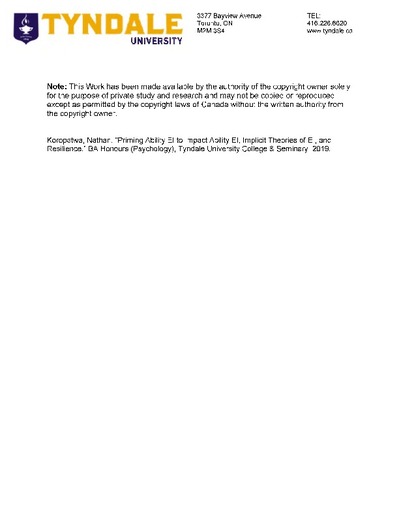| dc.rights.license | Attribution-NonCommercial-NoDerivatives 4.0 International License | en_US |
| dc.contributor.advisor | Ross, Nancy (Advisor) | |
| dc.contributor.author | Koropatwa, Nathan | |
| dc.date.accessioned | 2021-01-06T18:56:59Z | |
| dc.date.available | NO_RESTRICTION | en_US |
| dc.date.available | 2021-01-06T18:56:59Z | |
| dc.date.copyright | 2019 | |
| dc.date.issued | 2019-05 | |
| dc.identifier.citation | Koropatwa, Nathan. "Priming Ability EI to Impact Ability EI, Implicit Theories of EI, and Resilience." BA Honours (Psychology), Tyndale University College & Seminary, 2019. | en_US |
| dc.identifier.uri | https://digitalcollections.tyndale.ca/handle/20.500.12730/330 | |
| dc.description | Bibliography: leaves 45-55. | en_US |
| dc.description.abstract | This study examines priming as a means to increase emotional intelligence and the relationship between implicit theories of emotional intelligence, ability emotional intelligence, and resilience. Individuals with greater resilience have been connected to high emotional intelligence and growth mindset. The question that guided the study was: can priming emotional intelligence lead to a stronger growth mindset, and thereby also higher resilience? The sample included 71 undergraduate students (59 female, 11 male, one did not answer) from a small university in Ontario. Participants were randomly assigned to a successful emotional competency self-schema prime condition or a control condition. Then they completed two measures for Elder (in progress), an ability measure of emotional intelligence (the MSCEIT), a growth mindset measure, and a resilience measure. There was not a significant difference between the prime condition and the control condition in ability EI, growth mindset, and resilience. There was an interaction between condition and growth mindset for the MSCEIT branch understanding emotions, in that the discrepancy between moderate and high growth mindset was greater for those in prime condition. There were no significant correlations for growth mindset with any of the emotional intelligence scores. The overall emotional intelligence score and the area score for emotional experiencing was correlated to resilience in only the control condition. Multiple limitations in the methodology of the study are discussed that might have led to a lack of significant results. These findings failed to demonstrate an impact of the prime on EI, but extend research on the relationship between implicit theories of EI, ability EI, and resilience. | en_US |
| dc.description.tableofcontents | Introduction -- Method -- Results -- Discussion -- References. | en_US |
| dc.format.extent | 76 leaves | en_US |
| dc.format.mimetype | application/pdf/ua | en_US |
| dc.language.iso | en | en_US |
| dc.publisher | Tyndale University College & Seminary | en_US |
| dc.rights | Copyright, Nathan Koropatwa, managed by Tyndale University. All rights reserved. | en_US |
| dc.rights.uri | https://creativecommons.org/licenses/by-nc-nd/4.0/ | en_US |
| dc.subject.lcsh | Priming (Psychology) | en_US |
| dc.subject.lcsh | Resilience (Personality trait) | en_US |
| dc.subject.lcsh | Emotional intelligence | en_US |
| dc.subject.other | Dissertations, Academic--OWOBC--Tyndale University | en_US |
| dc.title | Priming Ability EI to Impact Ability EI, Implicit Theories of EI, and Resilience | en_US |
| dc.type | Thesis | en_US |
| dc.contributor.affiliation | University College | en_US |
| dc.contributor.committeeMember | Ross, Nancy (Committee Member) | |
| dc.contributor.department | Psychology | en_US |
| dc.contributor.repository | Tyndale University, J. William Horsey Library, 3377 Bayview Ave., Toronto, ON, M2M 3S4, Canada. Contact: repository@tyndale.ca | en_US |
| dc.identifier.bibrecord | https://tyndale.on.worldcat.org/oclc/1137540268 | en_US |
| dc.rights.holder | This Work has been made available by the authority of the copyright owner solely for the purpose of private study and may not be copied or reproduced except as permitted by the copyright laws of Canada without the written authority from the copyright owner. | en_US |
| dc.subject.keyword | Priming (Psychology) | en_US |
| dc.subject.keyword | Resilience (Personality trait) | en_US |
| dc.subject.keyword | Emotional intelligence | en_US |
| dc.subject.keyword | Brief Resilience Scale | en_US |
| dc.subject.keyword | Personal Implicit Theories of Emotional Intelligence Scale | en_US |
| dc.subject.keyword | Mayer-Salovey-Caruso Emotional Intelligence Test | en_US |
| dc.subject.keyword | Ability emotional intelligence | en_US |
| dc.subject.keyword | Implicit theories | en_US |
| dc.subject.keyword | Emotional competence | en_US |
| dc.subject.keyword | Growth mindset | en_US |
| dc.subject.keyword | Trait Emotional Intelligence Questionnaire Short Form | en_US |
| dc.description.note | For AODA accommodation, including help with reading this content, please contact repository@tyndale.ca | en_US |
| dc.degree.level | Bachelors | en_US |
| dc.degree.name | Bachelor of Arts Honours (BA Honours) | en_US |
| dc.description.degree | Thesis (BA Honours)--Tyndale University College & Seminary, 2019. | en_US |


